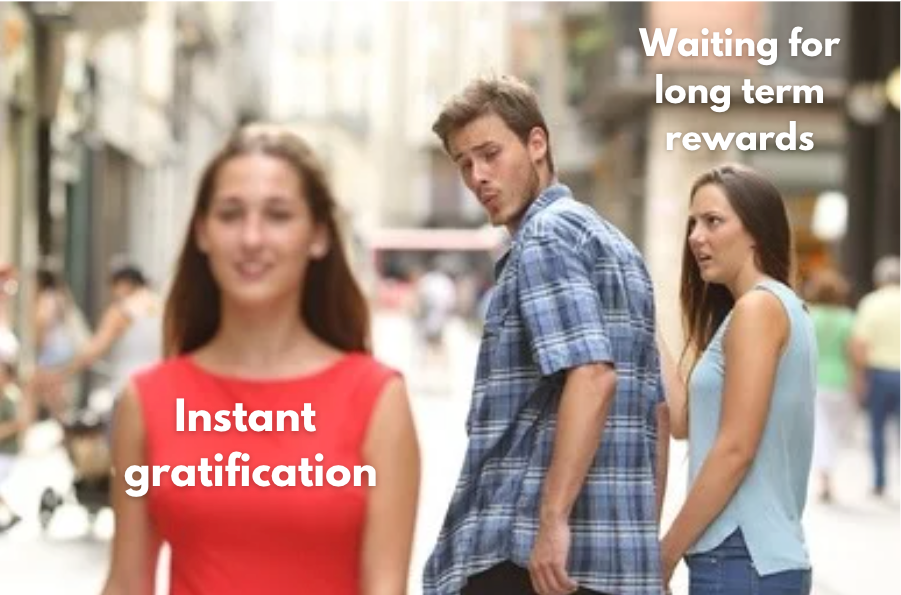
We all procrastinate…
The second we need to start on a task, it often feels like the perfect time to rearrange our wardrobe, or make ourselves a banging sandwich.
With all of the digital distractions and dopamine around us, it feels harder than ever to leave our comfort zones and pursue our passions.
We risk missing out on the opportunities our future selves will thank us for, like finally starting that project idea that’s been gathering dust in your notes app for the last year!
In this article, we’ll be uncovering some of the most fascinating reasons behind why we procrastinate, along with some quick tips to tackle these mental roadblocks.
Let’s dive in!
Your Life Is In Danger! (Sort of)
Would you believe me if I said we procrastinate to survive?
Thousands of years ago, finding food and avoiding death would have been the main priorities for early humans.
Over time, they would have learnt ways to increase their chances of survival, like delaying or avoiding conflict with threats such as a sabre-toothed tiger or a rival tribe approaching.
Fast-forward to 2024, and thanks to inherited genetics, we respond similarly, delaying and avoiding conflict ‘perceived threats‘.
Only now, these ‘threats’ look more like an endless to-do list or that content we need to post but can’t seem to finalise. Meaning, your brain thinks some words on a screen could end you. Crazy!
The truth is, our brains are optimised for survival, not to help us thrive in our ambitions, so it’s up to us to redefine our survival mindset to a growth mindset.
One that embraces challenges, rather than avoiding them!
Quick Tip:
Reframe the ‘threat’: Make tasks smaller and more manageable.
This will allow your brain to view them as less ‘life-threatening’ and more conquerable, reducing your desire to avoid working on them.

Procrastinate now and worry ’bout it later!
Ever wondered why we’re so bad at choosing long-term rewards over immediate ones?
Like why, we’ll choose to procrastinate and scroll on social media for hours, instead of working on that big project due next week?
The simple reason: we’re wired for instant gratification, and choosing immediate rewards is just too tempting for us.
But, the more delusional reason is that, there’s a part of us that thinks we won’t have to deal with the consequences of our own impulsive actions.
Psychology professor Hal Hershfield explored this and found that our brains produce similar neural activity when thinking about our future selves as when thinking about strangers.
Meaning, your brain thinks someone else is gonna have to suffer the all-nighter next week for you not working on that report today. Only if things really worked like that 🥲.
Quick Tip:
Practice delayed gratification: Techniques like the Pomodoro method or the 10-minute rule require you to focus on a task for a short, set time before rewarding yourself.
Knowing a guaranteed break is approaching can motivate you to make progress on a task, and also help you build the mental strength for rejecting those impulses that lead to procrastination.

We all want to be perfect accepted
If you’re like me and thought being a ‘perfectionist’ was a cool trait, I hate to break it to you, but you might’ve been low-key hiding behind a fear of disapproval.
From childhood, we’ve craved approval from others – friends, family, and in this digital age, even strangers behind screens.
This behaviour can also be traced back to early humans, whose survival often depended on group acceptance.
But let’s be real, scrolling through apps like Instagram and LinkedIn can make you feel like everyone’s super rich, and successful.
It’s easy to get caught up and think, “I’m wayy behind.” Now you’re putting things off because you feel like you can’t measure up, leading back to our comfortable habit of procrastination.
However, by reframing our view of failure and imperfection, we can reduce the influence of these factors that cause us to procrastinate.
Quick Tip:
You only fail when you stop trying: It sounds super cliché, I know, but progress needs failure, so embrace it!
Practice self-compassion: You wouldn’t tell a friend they’re not good enough to achieve that goal, so don’t do it to yourself, either.
Swapping that inner critic for a more compassionate voice can help you lose that desire for perfectionism, and strive for healthier progress instead!
Final-ish Thoughts
Procrastination is something we all deal with, regardless of how successful or skilled you are.
The key isn’t to eliminate it entirely, but to understand and manage the underlying thoughts and feelings that fuel it.
By doing so, we can gradually shift from avoidance to action and turn our procrastination into productivity!
Ps…
I don’t aim to come across as an expert, I’m on a journey with dealing this all of these issues myself ESPECIALLY PROCRASTINATION.
Infact this article was meant to be written and posted nearly 3 months ago…
But we’re here now so I guess that’s progress… anyways see you soon!

